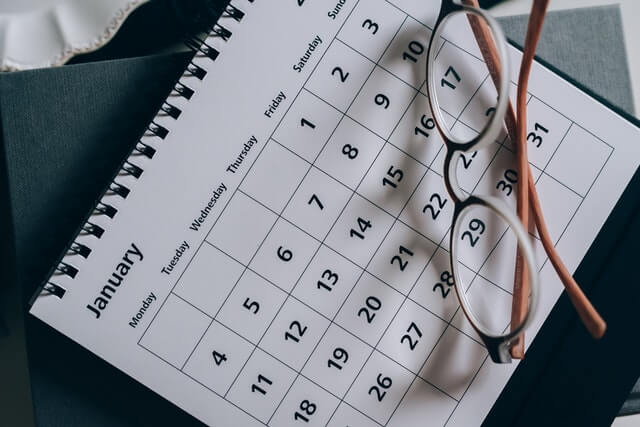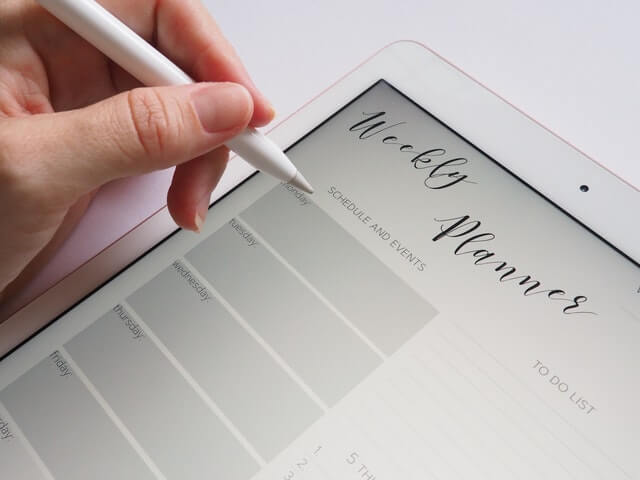This post may contain affiliate links. For more info, please read our full disclosure here
They say our habits can either make or break us. I find that statement to be very true.
As humans, there are some not-so-good habits we may fall victim to from time to time. And one of those, is Procrastination (dun-dun-dun).
Procrastination is one of those things pretty much everyone is guilty of at one point or the other. Including yours truly here. And as we all know, it doesn’t exactly leave us feeling our best most of the time.
If you’re someone who has, or is struggling with the nasty claws of severe procrastination, then I might be able to offer some help.
In this article, we’ll discuss what procrastination is, why we do it, and of course, 8 useful tips to help stop it in its tracks. Let’s get started.
Procrastination – What It Is And Why We Do It

No formal definition needed here. But in general, it’s when you’re supposed to be doing something at a certain moment, but you put it off till some point in the future.
As simple as it sounds, procrastination is actually a really broad thing, in the sense that there are a lot of different reasons why it occurs.
People tend to procrastinate for different reasons. For example, when they’re
- Anxious or worried about something
- Waiting for the “perfect” moment
- Lazy
- Overconfident
- Physically/mentally unable to complete that task at that given time
- And more
Chronic/Severe Procrastination
Before we continue, I’d like to get 2 things straight.
First is that these things listed above are all very normal things we all feel from time to time, and you’re not any less of a person for feeling them.
They may not be all good, but they’re “normal”. What matters is our approach in dealing with these factors.
The second point, is that not all instances of “procrastination” are necessarily bad. Most tend to be though, but not all.
For example, let’s say you planned on starting a project today, but due to some unexpected emergency, you had to put it off for a while to attend to the more pressing issue.
That is completely understandable and logical. However it falls into the “mild procrastination” category, since it’s not a regular occurrence.
What we’re dealing with here, are more severe or chronic reasons for putting things off.
Things that tend to occur more frequently, rather than rarely/occasionally and hence, can negatively affect our productivity, quality of life, sense of self, and so on.
So without further ado, here are 8 effective ways to help you give procrastination the roundhouse kick it deserves.
8 Effective Ways To Beat Procrastination
1) Minimize Your Distractions

One common reason why a lot of us procrastinate, is because we’re surrounded with tons of other things that could steal our attention easily.
It could be social media apps (we all know how addicting those are), checking emails endlessly, a quick glance at a movie clip which often results in us watching the entire movie, and so on.
It’s not that these things are inherently bad, but when they take up time meant for more important things, problems begin to arise.
Minimizing the number of distractions you’re exposed to can help you better focus on the things you are supposed to be doing, making procrastination less likely to happen.
How to do it
For example, you could try deactivating your social media apps for certain periods of time during the day. There are even some apps for that.
Another useful way to minimize distractions, is to create a dedicated working space, void of all things that could possibly steal your attention.
It could also involve putting your phone out of arm’s reach for a while, and only grabbing it in case of necessities, like taking or making a phone call.
Basically you need to identify the things taking up your time, and try to remove those things from your immediate space, making it easier for you to concentrate on the more important stuff.
Also See: 65 Productive Things To Do When Bored At Home
2) Start Small

Another common reason we tend to procrastinate, could be because the task set in front of us is a huge one.
Think about it. Which one sounds easier? Writing a 50 page report, or watching another episode of your favorite show? I’m sure most of us would choose the second option right off the bat.
We sometimes tend to leave bigger tasks for the future, in order to deal with smaller and less important things in the present.
While that may have its uses in some situations, it certainly shouldn’t be done often, or used as a means to temporarily avoid the things we need to do.
How to do it
Rather than thinking of that task or project as one big entity which must be taken down all at once, try to break it down into smaller bits and milestones that can be accomplished more easily.
Take for example the 50 page report. Rather than trying to get it done all in one go, try to focus on taking a chapter or two at a time.
Eventually, you’ll realize it’s easier to do even more, without even feeling the weight of the project. You’ll just find yourself doing it.
And before you know it, you’d have knocked off a good couple of milestones, or better still, completed the entire thing.
Also See: 10 Incredible Morning Habits For A Productive Day
3) Promise Yourself A Reward

Humans are innately drawn to rewards. It has been like that for ages. I guess you could say we’re just hard-wired like that.
When we were little, our parents would promise us yummy treats, or cool toys if we ate up all our veggies, or even the latest gadgets, if we came out top of our class.
When there’s a nice reward attached to something, we tend to find it a bit easier to do. The same idea could be used in the battle against procrastination.
How to do it
This one is pretty easy. You promise yourself a nice reward upon completion of a certain task, or crossing a certain milestone.
That way, you’ll find it easier to do the work you need to do, regardless of how uncomfortable it may be, knowing something nice is waiting for you at the end of it.
It is worth noting however, that your rewards should be within reason.
For example, binge-watching a series after 30 minutes of work isn’t the best idea. Similarly, treating yourself to a whole tub of ice cream after working out just ends up negating all the effort.
Your rewards should always be within reason, and should relate to the task accomplished (not negate it).
Also See: 75 Simple Daily Habits That’ll Improve Your Life For Good
4) Create A Schedule (And Stick To It)

You want to know the worst thing you can do to your productivity? It’s not having a solid plan. They say planning is everything, and those who do not plan, plan to fail.
Having a plan or schedule for what you want to do and making efforts to stick to that plan, is one of the best ways to get the most out of each day.
And it’s even more true, considering how cluttered and busy our lives are these days.
Sure, I know a number of unexpected emergencies may arise from time to time. But the fact still remains that having and sticking to a proper, well-laid out schedule is one of the best ways to get things done.
How to do it
Creating a schedule is easier than it seems. You want to make sure you’re planning your day ahead of time, rather than as events unfold.
Sure, flexibility in our day to day activities is important, but you need to have a basic plan in place first, and then adapt when necessary.
I do admit that sticking to the schedule tends to be the harder part. And it does take a bit of self-control, especially if you’re someone who easily falls prey to distractions along the way.
But eventually and over time, you’ll develop the required skills and self-control you need to create effective schedules, and stick to them.
Also See: 50 Simple And Effective Self-Care Ideas For Busy People
5) Re-evaluate Your Excuses

Like I said earlier, there are lots of reasons why we procrastinate. Some might be logical and reasonable. Others, not so much.
Therefore, it is important to pinpoint the reasons for our procrastination, and hold them up to scrutiny.
Take for example, you temporarily pushing off filing a report, due to a medical emergency, or an unexpected issue with the equipment required. That is completely understandable.
However, if you push off an important task to re-watch several episode from your favorite show, then that might not be the best idea.
That important task most probably has a deadline, or could negatively affect you in one way or the other if not completed. That show, not so much.
How to do it
Trust me, I know pushing things forward is certainly the easier thing to do. But if you’re doing so for the wrong reasons, then it’ll only lead to more problems down the road.
A good approach to this, is to properly scrutinize your reasons for procrastination.
Basically you want to be asking yourself “is this thing (the distraction) really worth putting off this important task for?”
Once you begin to take a closer look at the things causing you to procrastinate, eventually it becomes easier to avoid or say no to them.
Also See: 8 Toxic Habits To Get Rid Of For A Happier Life
6) Take Advantage Of Productivity Bursts

It’s no news that our productivity levels fluctuate throughout the day.
During certain hours of the day, we feel like we could take on the world. And during other times, something as simple as writing our own name on a piece of paper might feel like a near-impossible thing to do.
Ok, a bit of an exaggeration there, but you get the point.
Personally for me, I’m at my most productive early in the morning. And anything after 8pm feels like I’m lifting a boulder.
Your own peak productive hours could be different, and that’s completely fine too.
How to do it
The important thing is identifying those periods of time when you’re most productive, and ready to take on anything, and use them to your advantage.
Certain external factors, such as the right music playlist, can also help put us in the mood, and get us all fired up.
Taking advantage of these things can give us the little nudge we need to get started on whatever important thing we need to do for the day. And once the day is over, you’ll be thanking yourself.
7) Forgive Yourself

You know that feeling you get at the end of the day when you know you wasted the whole day? Yeah, it’s not really a top-of-the-world feeling.
Procrastination often leaves us feeling bad for not getting stuff done, which leaves us in a bad state to get things done, which can then lead to further procrastination. And then the cycle goes on and on until we finally get something done.
No one is perfect. We all fall short every now and then. We all get lazy from time to time, or get anxious and put things off, or whatever other reason people procrastinate.
How to do it
Being too hard on yourself can put you in a really bad mental state, and lead to even more procrastination, or worse problems along the line.
Don’t get me wrong. You certainly want to be able to hold yourself accountable for your actions as well as your inactions.
But try not to tighten the grip around your neck too much. You are only human after all.
A much better approach, like I stated earlier on, would be to take note of whatever things could be causing you procrastinate, and make the necessary efforts to ensure they don’t happen again, or as often.
8) Remind Yourself How Important The Task Is

Sure, most of the time, we know that the task we’re supposed to be handling is pretty important.
But when we get surrounded with, or fall prey to distractions, we tend to mentally push the more important task to the back of our mind, thereby making it lose some of its priority.
A good way to combat this, is to constantly remind yourself how important that task or project is.
This sort of affirmation reinforces the priority of what you’re meant to be doing. And therefore can help you become more mentally prepared to tackle it, even if you don’t exactly feel like it.
Summing It All Up
Procrastination, especially severe and chronic procrastination affects a lot of people today, and can cause some serious problems if left unchecked.
Thankfully, with the right steps in place, it can be properly dealt with, and stopped. These 8 useful tips will help you beat procrastination, and eventually improve your quality of life.